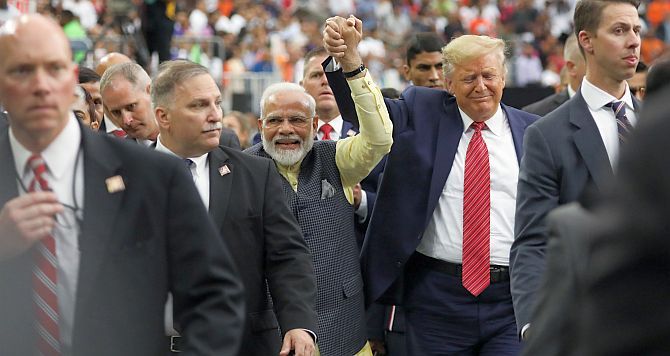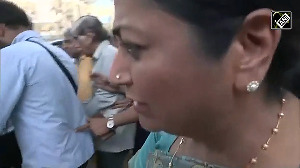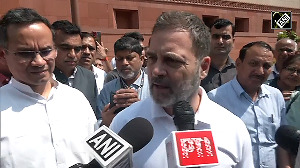'With Trump, the relationship was very transactional, whereas with President Biden it is very structured.'

Dr Mukesh Aghi is the President and CEO of the US-India Strategic Partnership Forum that works extensively with business and government leaders in the US and India to promote trade and strengthen ties between the two countries.
Prime Minister Narendra D Modi will attend and address a special event hosted by USISPF on Friday, June 23, 2023, at the Kennedy Center in Washington, DC that is expected to be attended by over 1,100 business leaders, academics, US Congressmen and Senators.
"The GE engine deal is a pivotal moment for India. When we signed the nuclear deal in 2006, there was no technology transfer. But now, if India starts making hot engines for planes in India, it will be the fifth country in the world to do that, after Russia, France, the UK and the United States. Not even China makes hot engines. That to me is a changing of the relationship," Dr Aghi tells Rediff.com's US Contributor Abhijit J Masih in a Zoom call.
India has deregulated a lot of defense production to the private sector, does it pave the way for more deals being signed?
These are more transactions and they don't define the relationship in a very concrete manner.
I think what we see is more of a technology partnership and technology transfer, that builds a relationship for the next 30 years.
For example, the GE engine deal is a pivotal moment for India.
When we signed the nuclear deal in 2006, there was no technology transfer.
But now, if India starts making hot engines for planes in India, it will be the fifth country in the world to do that, after Russia, France, the UK and the United States.
Not even China makes hot engines. That to me is a changing of the relationship.
We're looking at areas such as AI, we're looking at areas such as quantum, we're looking at cybersecurity.
So there's lot of areas we're looking at where technology can be brought between the two countries.
Other than the GE deal, would you have knowledge of any other deals that might take place?
At the moment, I think the announcement is on GE. What I'm seeing is US companies setting up more and more defense manufacturing in India.

Considerable steps were being taken during the Trump administration in terms of US-India trade ties which sort of slowed down at the beginning of this administration.
The US revoked India's trade preference under the Generalized System of Preferences program.
What are the impediments that you would like removed for better trade relations?
Well, for whatever reason, the Biden administration is not focused on trade deals. They have not signed any trade deal with any country in over two years.
The question I have to ask is, does India need a trade deal to accelerate the process of more trade between the two countries and my thinking is no.
Because without a trade deal, we are seeing business growing, both from India's export perspective and also import perspective.
On the GSP, if you look at the items listed, they are the fastest growing exports from India to the United States.
India is becoming more efficient, if a trade deal comes well and good, though there is growing trade between the two countries.

Foreign Direct Investment by US into India is always highlighted, but India's investment into the US is not often talked about? How is USISPF helping Indian companies?
We are seeing a lot of investing with the tech companies. They are setting up service centers, R&D centers and customer centers here in the US.
We're seeing Indian pharma companies setting up contract manufacturing in the US.
They are also manufacturing generic drugs for the US market. I saw a study which said that Indian companies are putting up $40 billion into the US creating hundreds and thousands of jobs.
So, I think that process continues. We work with them when we can to support them.
And it's the same thing we're doing with US companies going to India. That process continues.
Would the upcoming elections in both countries be a cause of additional protectionism and caution?
I don't think so, because what we have seen is that protectionism does not drive economic growth.
It stifles the competition and stiffens the innovation. When you look from India's perspective, it is opening up its market.
It is encouraging US companies, especially from China to move into India.

Mr Modi's clout and charisma is undeniable.
What more needs to be done for India to gain a seat at the high table of global diplomacy?
You have a prime minister who built a very close relationship with President Obama, built a very strong relationship with President Trump and now he's built a very, very, strong relationship with President Biden.
I think you have geopolitical alignments taking place. His personal leadership, building a personal relationship, helps the interest of both countries to move the agenda much more explicitly, it makes things happen much, much faster.
I think the relationship between President Biden, President Xi and Prime Minister Modi is going to help as we look at geopolitical scenarios.
The other factor which is also impacting is the Indian diaspora.
They also are keen to build this relationship. They are reaching out to Congressmen, Senators and the White House to make sure the relationship continues.
So to answer your question, all the global leaders, the surveys I read, Prime Minister Modi comes out to be the most popular. He is very well connected and basically builds friendships.

You mentioned how he had built personal relationships with previous US Presidents and there seemed a very personal camaraderie between President Trump and Prime Minister Modi, but not much was done.
Do you think that a lot more has been done with President Biden with less noise and thunder?
Well, absolutely. I think with Trump, the relationship was very transactional, whereas with President Biden it is very structured.
He has a team, which is driving the same agenda. (US National Security Adviser) Jake Sullivan was in India last week and before that you had (US Secretary of Defense) Lloyd Austin in India.
They are all basically moving in the right direction as an administration.
Regardless of how much noise you make, a lot has been done between India and the United States in the last two years than it was done before.
What are the threats that may cast a shadow over this historic visit?
You can always have challenges and threats. When you have a progressive Left constantly hammering on human rights and religious freedom in India, it kind of doesn't put a dent, but it does take away the satisfaction and the joy of this relationship.
I don't think that's going to derail the relationship.
It's time to celebrate.
I don't see any critical threat coming in as Prime Minister Modi comes to Washington DC.

Is there pressure on both sides, especially before an election year, to display a special relationship and to not let any difficult topics be put on the table for discussion.
No, I don't think there's any pressure. I think both sides are genuine about building this relationship.
It is an opportunity for the US to partner with a nation which is rising, a nation which is going to be great and to have that democratic value system.
It's a win-win for both countries. So I don't think either side is under pressure.
If they were under pressure, they wouldn't be meeting, there won't be a State visit.
It serves the interests of both countries to come up with a value proposition where both countries succeed.
How does this visit impact the Indian American community?
Indian Americans are proud that the country they left is rising. They are proud that more US investments are going to India.
It raises spending power and it raises the quality of life of the citizens of India.
Any engagement does have a positive impact for millions of Indian Americans to make this partnership, this relationship, highly successful.
Feature Presentation: Aslam Hunani/Rediff.com











 © 2025
© 2025